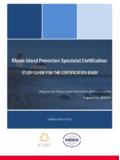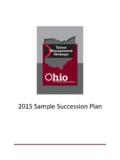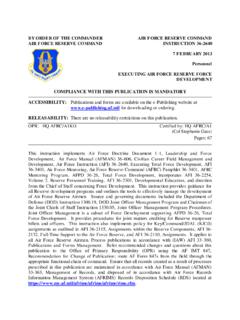Transcription of It’s Time to Prioritize Career Management Strategies
1 It s Time to PrioritizePresentation to WACABAE lise Freedman, Director, Talent ManagementTheresa Lynch, Director, RewardsNovember 21, 2013 Career Management StrategiesProprietary and Confidential. For Towers Watson and Towers Watson client use only. Latest Research2 Proprietary and Confidential. For Towers Watson and Towers Watson client use only. Employees and employers agree on the value of Career Management .*Employee viewEmployer viewAdvancement in Career is the most cited reason they joined their organization. Lack of Career advancement is the 2ndmost cited reason to leave. Advancement in Career is themost cited reason employees join an organization. Lack of Career advancement is the mostcited reason they would leave.
2 3rd2ndSource: 2012 Global Workforce StudySource: 2013 Talent Management and Rewards Study*Ranking out of 27 options3 Proprietary and Confidential. For Towers Watson and Towers Watson client use only. Yet many organizations fall short in their Career Management efforts. agree their employees are often able to achieve Career their employees understand how they can influence their and Confidential. For Towers Watson and Towers Watson client use only. Whyare so many organizations missing the mark? Career architecture and paths are poorly defined Career architecture and defined vertical Career dual Career paths for people managers and individual contributors. 26%32%28%As a result,only1out of 3organizations has developed effective tools and resources for Career and Confidential.
3 For Towers Watson and Towers Watson client use only. Technology is not effectively leveraged for Career than halfof organizations make effective use of technologyto provide employees access to Career Management tools and the same than halfof organizations make effective use of technology to provide employees access to employee learning and development and Confidential. For Towers Watson and Towers Watson client use only. Managers are ill equipped to handle key aspects of Career Management . Only1In 4employers say managers are effective at providing Career Management support to and Confidential. For Towers Watson and Towers Watson client use only. Most organizations don t know if their Career Management programs are working.
4 Only38%monitor the implementation of Career Management programsto ensure they are consistent with their objectives and guidelines. ??8 Proprietary and Confidential. For Towers Watson and Towers Watson client use only. Effective Career Management is a key component in the total rewards portfolio. Career Management encompasses the strategy, tools, processes and technology that enable talent development, agility and Are the Components of Career Management ?Overarching Career Management StrategyEstablished Career ArchitectureVisible and Viable Career Path AlternativesAligned Competency FrameworkIntegrated Development Planning Process9 Proprietary and Confidential. For Towers Watson and Towers Watson client use only. To improve Career Management programs: Ensure that Career architecture and Career maps not only reflect HR and business Strategies , but also provide a framework for communicating with employees.
5 Train managers to identify and communicate Career opportunities tailored to each employee s skills and experience. Use technology to improve Career Management tools and resources. About the SurveyThis survey was conducted in August 2013 . A total of 160 organizations participated, including 36 from Canada and 124 from the to learn more? Contact your local Towers Watson and Confidential. For Towers Watson and Towers Watson client use only. Career Management Strategies & Suggestions11 Proprietary and Confidential. For Towers Watson and Towers Watson client use only. 12 What is Career Management ? Career Management refers to an organization s approach towards developing employees and providing them with meaningful opportunities to progress in their careers Career Management brings together processes, tools and resources that support both employees and the company in several key ways:Bottom line: Career Management helps companies deliver a strong Employee Value Proposition, while building talent and capabilities to support the business needsBottom line.
6 Career Management helps companies deliver a strong Employee Value Proposition, while building talent and capabilities to support the business for for Company Greater transparency of Career opportunities and role expectations Information and tools to help you manage your own Career Enhanced ability to define and achieve your Career goals Enhanced ability to identify and close gaps in your capabilities Bench strength to fill critical roles Promotes employee engagement Employee skills and aspirations aligned with current and future organizational needs Organizational development efforts focused where they are most neededProprietary and Confidential. For Towers Watson and Towers Watson client use only. What is the Career Management Strategy?
7 Career Management Strategy Anoverall statement of what the company believes and wants to communicate about the value and importance of Career Management A set of principles that will guide the direction and execution of Career Management communications and tools Why we do it How we do it The next slide provides an example of what we mean by the Career Management strategy for client projects. We often begin with a similar format, but tailor as next slide provides an example of what we mean by the Career Management strategy for client projects. We often begin with a similar format, but tailor as and Confidential. For Towers Watson and Towers Watson client use only. Illustrative Career Management StrategySample Strategy Statement Career Management is at the heart of our EVP it forms the basis for our long term commitment with our staff Career Management provides employees with the skill building and development needed to enable Career success, and it ensures the acquiring and building of talent to support our company s objectives Career Management supports our mission to develop effective employees2.
8 We will build a culture of continuous learning where all employees feel comfortable giving and receiving feedback related to professional development and Career aspirations1. Career Management is equally the responsibility of our company, leaders and employees, with each playing a critical role 3. Our Career Management processes and tools will be transparent, user friendly, and continuously improved for relevance and qualitySample Guiding PrinciplesSample Guiding PrinciplesCareer Management StrategyClients vary in the level of detail required for their Career Management strategy. For some cases, a simple set of statements, such as those illustrated here, are other cases, clients require a more elaborate, highly detailed document outlining their overall approach to Career Management .
9 14 Proprietary and Confidential. For Towers Watson and Towers Watson client use only. Questions Considered in Developing the Career Management StrategyHow do we define advancement? New competencies, new level, new location, new functional area?How will employees gain the necessary experience, and how long will it take?How will we fulfill staffing requirements/recruit for talent?Both short term and long term?Who is eligible for a Career ?Does everyone have an opportunity?When do we make these determinations?What promise do we make to people?How do we hold our employees accountable for development?How do we measure successful careers?What tools do we use to enable talent development?How do we bring Career Management to life?
10 How do we communicate the value of investing time in Career development?How do we bring visibility and transparency to Career options?What types of skill sets will be critical?Do we need generalists, specialists, or both?Which technical skills will be essential? Career Management Strategy15 Proprietary and Confidential. For Towers Watson and Towers Watson client use only. Offer clear line of sight with organizational goals; provide opportunity to work hard; recognize for life long serviceCreate clear connections between contribution and reward; promote readily; use metrics to define successEmphasize CM as an individual development tool; offer ready access to manager; enable collaboration over competitionOffer continual recognition; enable personalized goal setting; utilize spot bonuses and tailored assignments as recognitionCareer Management : Personally Meaningful for All GenerationsFor one of the first times ever, there are four generations present in the workforce.







